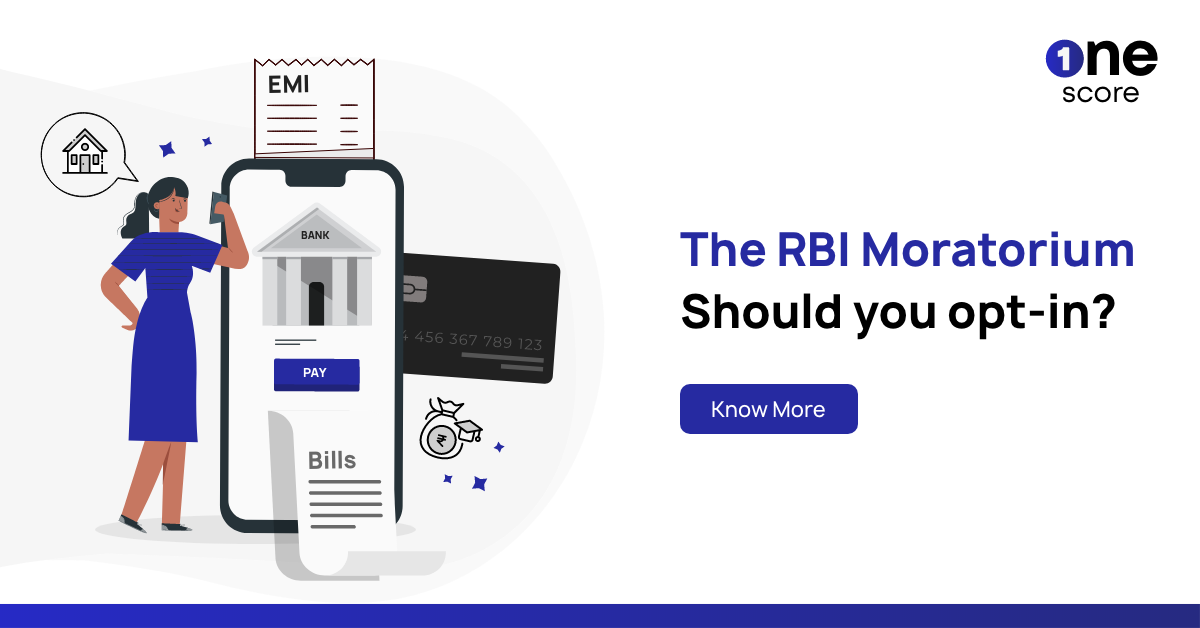The RBI Moratorium Explained
Due to COVID-19, the RBI has asked banks and NBFCs to offer a 3 month moratorium on EMIs and credit card dues. Should you opt-in?

We’re currently in the midst of one of the worst pandemics ever with almost all business and individual activity grinding to a halt. With companies either closing down temporarily, laying off staff, others working from home, the situation is a grim one.
To ease financial difficulties which a large number of people are facing due to this, the Reserve Bank of India (RBI) announced a COVID-19 package, permitting all commercial banks and NBFCs (Non-Banking Financial Corporations) to allow a moratorium of 3 months on all term loans (including home, education, personal, auto loans) as well as credit card dues outstanding as on March 1, 2020. The moratorium is effective from March 1, 2020 to May 31, 2020.
Update:
In his statement on May 22, 2020, the RBI Governor announced that the moratorium has been extended by another three months, from June 1, 2020 to August 31, 2020.
- If you have an ongoing loan and opt for this offer, the bank/NBFC will not charge EMIs for these 3 months.
- If you have any amount outstanding on your credit card and opt for this offer, the bank will not levy any late payment charges for these 3 months.
- Additionally, this will not be reported to the credit bureau as a default, and it will also not affect your credit score and history.
All good so far?
In their circular dt. March 27, 2020, RBI had mentioned that this moratorium is NOT mandatory and banks and NBFCs are permitted to offer it to customers at their discretion.
In a recent twist, RBI has emailed banks on 06-Apr, and now asked them to make this “opt-out” - which means make the moratorium mandatory for ALL customers except those who specifically say they do not wish to avail of this option.
This has ended up creating even more confusion than before and the question is - whether optional or opt-out, how does it affect you and should you choose to accept it?
Well, the devil is always in the details and it’s the same here too.
This moratorium is intended to provide only a temporary relief by way of a deferment. It is NOT a 3 month loan waiver. Not only will the interest continue to accrue during these 3 months, but it will be done on a compounding basis, which means you will end up paying a much higher amount than what you’re paying now.
How Banks and NBFCs are reacting to the moratorium
Different banks and NBFCs are approaching this issue in different ways. While most have communicated to customers that they can opt-in for this offer, several others have yet to make any such announcements.
Broadly, if there is no action or confirmation from either side, it means things will go on as before and your bank will deduct EMIs on the due date. Credit card payments (either the entire outstanding amount or at least the Minimum Amount Due) would need to be made on or before the due date.
EMIs and credit card dues payable between March - May 2020 which are not paid due to this moratorium will not be reported to credit bureaus as a late payment or a default, so it would not affect your credit score.
Each bank is communicating with their customers via email, SMS and even on their website, so depending on your existing loan and credit card dues, check with those respective banks.
If you wish to opt for deferment, the bank may present you with three options:
- Increase your loan tenure keeping EMI amount same
- Keep the tenure unchanged and increase the EMI amount
- Make a one-time payment in June 2020 for interest accrued over 3 months
Further, since the announcement was made on March 27, most borrowers would have already paid their EMIs for March. Some banks are offering to refund EMI for March if you choose the moratorium offer and apply for refund.
If you have a credit card with outstanding dues as on March 1, you do not have to pay even the Minimum Amount Due till May 31.
However, interest will be charged not only on the outstanding amount but also on the accrued interest, which, depending on your dues, can be huge as the rate of interest can be as high as ~ 42-45% per annum, and will become payable in your bill for June.
This doesn’t sound so good after all. What next?
It’s simple.
Use this moratorium only if you are struggling with your finances in the present moment and feel you can arrange funds by June.
If you have an emergency fund in place to see you through the next 6 months, and can comfortably repay these loan/credit card dues each month, you should.
Opt-out of the moratorium. Avoid paying unnecessary interest charges.
**Disclaimer: The information provided on this webpage does not, and is not intended to, constitute any kind of advice; instead, all the information available here is for general informational purposes only. FPL Consumer Solutions Private Limited and the author shall not be responsible for any direct/indirect/damages/loss incurred by the reader in making any decision based on the contents and information. Please consult your advisor before making any decision.
- OneScore , April 10, 2020

